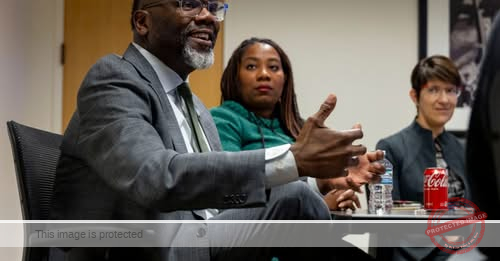
Mayor Brandon Johnson and top city officials are hosting potential buyers of city debt to hear Chicago’s borrowing and spending plans this week, a key moment that is happening behind closed doors as the mayor faces another financial crossroads.
Members of the press typically are allowed limited access to the two-day event that kicked off Thursday, to hear presentations from top budget and finance officials or addresses from the mayor. This year, the media is barred from attending.
In past years, city officials have made major financial announcements, including Mayor Rahm Emanuel’s plans to raise water and sewer taxes and a potential special borrowing plan on his way out of office to help ease the pension burden. Reporters were allowed to attend the Johnson administration’s investor conference in 2024.
Administration officials say the change came this year at the request of attendees who wanted to ask candid questions without reporters present. A Tribune reporter who requested entry was turned away at the Union League Club, where Thursday’s presentations were taking place.
Earlier this week, several news outlets — including the Tribune, Crain’s Chicago Business, the Chicago Sun-Times, WBEZ, Bloomberg, Block Club Chicago, and the Better Government Association — wrote to Johnson’s Chief Financial Officer, Jill Jaworski, to urge access.
“Closing it to the media undermines the transparency that residents and taxpayers deserve — particularly at a time when major decisions about debt, investment, and budget strategy are being made,” the letter said. Jaworski did not respond before the conference kicked off.
The city hopes to either bond or refinance more than $4 billion in debt this year, according to administration briefings from late April obtained by the Tribune. That includes a $1 billion general obligation infrastructure plan already approved by the City Council, the kick-off of Johnson’s landmark Housing and Economic Development bond, and potentially, $2.3 billion for the city’s airports.
The schedule would vary based on “market volatility and continued uncertainty,” the presentation noted.
According to the conference agenda, Thursday will include a brief “State of the City” presentation from Jaworski; a policy presentation from Chicago Transit Authority officials; a city budget and credit panel with Jaworski, Budget Director Annette Guzman and Chief Operating Officer John Roberson; and a governance panel featuring Mayor Johnson. Friday will feature tours of developments along the Chicago riverfront and of the Jardine Water Purification Plant, the Salt Shed and the United Yards affordable housing project.
Johnson’s finance team has argued it is digging out from decades of poor fiscal management, an endeavor that will take years and a delicate balance to prevent widespread layoffs of city workers and cuts to public services. The city has met its debt obligations, maintains a solid economy, and is still a target for private investment, they argued, pointing to the new quantum campus slated for the city’s far South Side and the new megadevelopment around the United Center
But ratings agency S&P said earlier this year that Johnson’s 2025 spending plan left “a sizable structural budgetary imbalance” that would make future budgets tougher to balance. It downgraded the city’s general obligation debt to BBB, two notches above junk. The rating reflects the city’s ability to meet its financial commitments, but susceptibility to “adverse economic conditions.”
